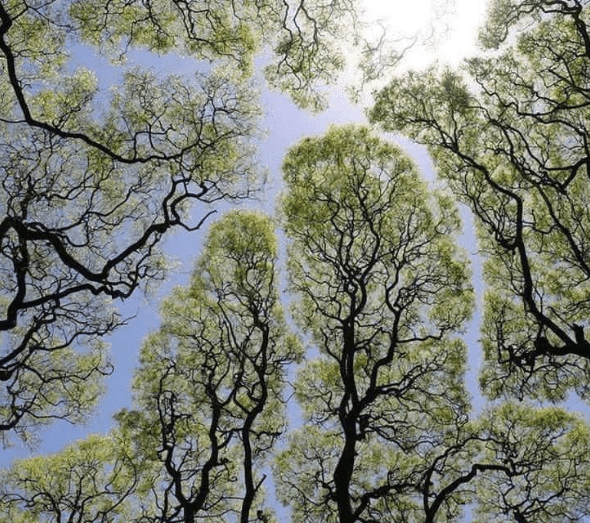The month of April is a time when the magic of Spring brings new life back to the natural world around us: flowers are in bloom, trees grow their leaves back, the sun shines brighter, and the sound of rain is heard more frequently.
April is therefore the perfect time to reflect upon the beauty of nature, the wisdom in it, and our responsibility to keep the natural world heathy. That is why April is also when special days like Earth Day (the 22nd), Audubon Day (the 26th) and Arbor Day (the 29th) are all celebrated.
Earth Day was established as a day for environmental awareness and participation in activities of environmental conservation. Audubon Day commemorates the birth of John James Audubon, whose passion for studying the birds of America inspired the founding of the Audubon Society, a nature preservation organization. Finally, Arbor Day is a day celebrated on various days internationally in which we are encouraged to go out and plant trees.
Beauty of Nature
These days remind us of the importance of appreciating nature and keeping our planet healthy. Similarly, all religions express deep reverence for nature as God’s creation and as a laboratory in which we can learn important spiritual principles.
Flow like a river. Stand tall like a tree. Love unconditionally like the sun and rain. Share your aroma like flowers, without expecting anything in return. Be the drop as well as the ocean. The second you open your eyes and ears to understand that you are but a tiny speck in this wonderful play of nature, life begins to change. You align with that intelligence that has created a landscape that is immense and beautiful.
Connect with Nature
The extraordinary surround-sound beauty of the natural world has always been a huge source of inspiration. Pausing and observing nature has catalyzed human beings’ greatest achievements—artistic, literary, scientific. Newton discovered gravity after an apple fell from a tree; Wordsworth immortalized Daffodils; Vincent Van Gogh painted sunflowers.
Not just a teacher, nature is also a friend. The Nobel laureate Rabindranath Tagore wrote: “I remember, when I was a child, that a row of coconut trees by our garden wall, with their branches beckoning the rising sun on the horizon, gave me a companionship as living as I was myself.”

Spiritual Wisdom
All religions have drawn from nature and used its elements as metaphors in their parables and teachings. It is a universal ineffable landscape that connects all mankind.
Water reminds us to remain clear and pure; trees tell us how to be rooted and yet branch out; the sun is all about unconditional love; the wind reminds us that there are unseen forces beyond our control that will impact us; and we learn that both a drop of water and a mighty ocean are made of the same essence—water.
The wisdom embedded in nature was also the source of inspiration for ancient systems of human physiology and medicine that have been kept alive for millennia. These include Traditional Chinese Medicine (TCM), which has been a fundamental component of Chinese religions like Taoism and Confucianism, and the Indian system of Ayurveda, which crosse over into many Indian religions.
Both TCM and Ayurveda involve the use of herbs and other natural remedies to restore health and fight disease, under the belief that we are all children of nature and nature has provided for everything we need. Both systems have also grown more popular in recent years outside of their native cultures, especially in the US and other parts of the Western world, where people feel there are certain flaws or blind spots in Western medicine.
Sometimes we forget that we, too, are products and components of the natural world. We get so caught up in our social and professional lives that we forget to take the time to go for a quiet walk in the woods or sit by a river and rediscover the parts of ourselves that we see reflected in the beauty of the natural world, from which we still have so much to learn.
The unconditional love, learning opportunities, and playfulness we experience when immersing ourselves in nature is a reflection of our true selves, which are defined by our deepest longings: loving, learning, and playing—what I refer to as LLP.
Nature and Spirituality
Christianity and Nature
“Nature never taught me that there exists a God of glory and of infinite majesty. I had to learn that in other ways. But nature gave the word glory a meaning for me. I still do not know where else I could have found one.”
— C.S. Lewis, writer and Christian theologian
Nature and Islam
“Have you not considered how Allah presents an example, [making] a good word like a good tree, whose root is firmly fixed and its branches [high] in the sky?”
—The Qur’an (14:24), Islamic scripture
Nature and Judaism
“But ask the animals, and they will teach you, or the birds in the sky, and they will tell you; or speak to the earth, and it will teach you, or let the fish in the sea inform you. Which of all these does not know that the hand of the Lord has done this? In his hand is the life of every creature and the breath of all mankind.”
—Hebrew Bible (Job 12:7-10), Jewish text
Baha’i and Nature
“Nature in its essence is the embodiment of My Name, the Maker, the Creator. Its manifestations are diversified by varying causes, and in this diversity there are signs for men of discernment. Nature is God’s Will and is its expression in and through the contingent world.”
—Baha’u’llah, Baha’i prophet
Nature and Hinduism
“All actions take place in time by the interweaving of the forces of Nature, but the man lost in selfish delusion thinks that he himself is the actor. But the man who knows the relation between the forces of Nature and actions sees how some forces of Nature work on other forces of Nature, and becomes not their slave. Those who are under the delusion of the forces of Nature bind themselves to the work of these forces. Let not the wise man who sees the All disturb the unwise who sees not the All.”
—The Bhagavad Gita (3:27-29), Hindu text
“Krishna, the mind is restless, turbulent, powerful, violent; trying to control it is like trying to tame the wind.”
—The Bhagavad Gita (6:34), Hindu text
Nature and Buddhism
Irrigators channel waters; fletchers straighten arrows; carpenters bend wood; the wise master themselves[…]Just as a solid rock is not shaken by the storm, even so the wise are not affected by praise or blame.”
—The Buddha
Because we all share this small planet earth, we have to learn to live in harmony and peace with each other and with nature. That is not just a dream, but a necessity. We are dependent on each other in so many ways that we can no longer live in isolated communities and ignore what is happening outside those communities, and we must share the good fortune that we enjoy.”
—The Dalai Lama, Tibetan Buddhist leader and activist

Nature and Confucianism
“Heaven, in the production of things, is sure to be bountiful to them, according to their qualities. Hence, the tree that is flourishing, it nourishes, while that which is ready to fall, it overthrows.”
—The Doctrine of the Mean, Confucian text
“All things are nourished together without their injuring one another. The courses of the seasons, and of the sun and moon, are pursued without any collision among them. The smaller energies are like river currents; the greater energies are seen in mighty transformations. It is this which makes heaven and earth so great.”
—The Doctrine of the Mean, Confucian text
Nature and Daoism
“Lieh-tzu was not a person given to casual chatting. After his students begged him tirelessly for half a day, he finally said, ‘Think about this. Old man sky never says a word, but we can see that everything has its place in the universe. Nature has a lot to teach us. All you need is to open your eyes and look. The changes you see in nature follow a course. The four seasons behave in a regulated way. In truth, all human matters follow the same principles as the workings of heaven and earth. What more is there for me to say?”
—Lieh-tzu, Daoist text
Popular Reads
Fire Symbol Meaning | Religious Garments | False Narrative | Define Charioteer | Tree of Life | Divine Words | Music is a Universal Language | Allegory of the Cave | Flood Myth | Creation Stories from Different Religions | Hippocratic Oath | Fasting and Religion | Spiritual Transcendence | Sacred Books of Religions | What is Divine Justice | Believing in a Higher Power | Spirituality and Money | Oneness with God | Religious Conversion | Religious Ritual | Sacred Spaces | Promised Land Meaning | Union with God | Tithing | Spiritual Awakening | Golden Rule in all Religions | Love and Social Justice | Common Themes in all Religions


